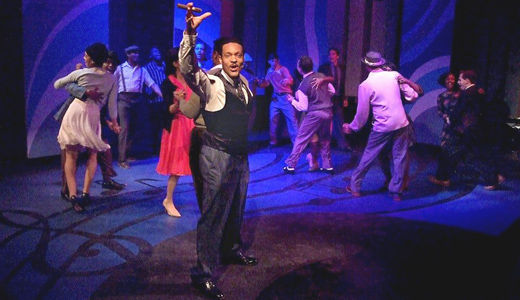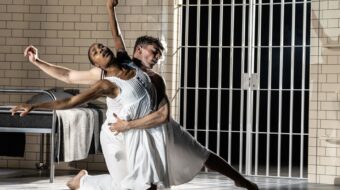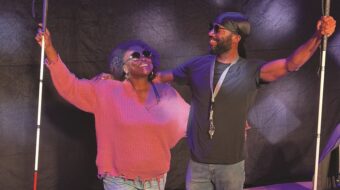
CULVER CITY, Calif. – Trailblazing businessman John Dolphin envisioned opening up a record shop in Hollywood that would feature the latest and best popular music in America. The store would have a stage, a dance floor and party space, a recording studio for his new releases, and a live radio DJ featuring his products. It would be a meeting place for music lovers of all ethnicities from every part of the city, and indeed the world. He would give away a promotional new recording with each purchase. Eventually he would keep his doors open 24 hours a day, 7 days a week.
No one would rent him a storefront in Hollywood in 1948. The violent racism he had left behind in the Deep South as part of the Great Migration northward for jobs and opportunities (he worked at Ford in Detroit for some years) returned in other forms once he set foot in sunny post-war Los Angeles.
Dolphin’s father had changed the family name away from the slaveowner’s name his forebears had borne for decades. Starting up anew seemed to be in the family blood. But with Hollywood ruled out, John revised his ambitions and opened Dolphin’s of Hollywood (he refused to admit defeat on that point), blocks south of downtown, on Central Avenue, corner of Vernon in South Central, the heartbeat of Black L.A.
Within a short time, music fans flocked there to absorb the fresh sounds of Dolphin’s talent. Officers from notoriously racist and anti-communist Chief William H. Parker’s L.A. Police Department, couldn’t help noticing an ambitious Black man’s entrepreneurial success, which included interracial partying and dancing at the shop. Cops, and presumably the “upstanding” citizens behind them, objected to Dolphin’s “peddling all these dirty records for white kids.” It was the same era memorialized in the Broadway show and film Hairspray, about integration on Baltimore’s Bandstand TV. Dolphin’s every move began to be carefully scrutinized, leading to arbitrary raids and arrests.
Dolphin’s shop became the most famous record store in the country, visited by Hollywood stars out for a local musical escapade, and performers such as Billie Holiday, Ella Fitzgerald and Elvis Presley. His most famous DJ was Dick “Huggy Boy” Hugg, and the roster of artists on his labels (Recorded in Hollywood, Money, Cash, Lucky and Ball) included some of the biggest up-and-coming stars of the pre-Motown era in various genres – R&B, gospel, blues, jazz, doo-wop, rock ‘n’ roll, even western music and the beginnings of the California surfing sound. A few of his discoveries included Sam Cooke, Jesse Belvin, Charles Mingus, Pee Wee Crayton and Major Lance.
Dolphin’s grandson Jamelle Dolphin authored the book Recorded in Hollywood: The John Dolphin Story, published in 2011, based on research and the many colorful family stories he had heard all his life. Discussing changes made to the script following its earlier incarnation in a smaller 99-seat theater in Hollywood last year, he explains that with the Broadway producer Lou Spisto now on board, some new talent in the cast and reshaping to the book, “the relationships between John, Sam Cooke, Jesse Belvin, and Huggy Boy are more central to our story, as is the key relationship with my grandmother Ruth Dolphin. We spend more time getting to know my grandfather, personal warts and all, as he struggles to find his place in the world and finally become a real leader in South Central.”
Veteran Broadway actor Stu James reprises his John Dolphin role. Other key roles include Eric B. Anthony as Percy Ivy, the ever-hopeful singer whose undeveloped gifts Dolphin never completely embraced; Jenna Gillespie as the forgiving wife Ruth Dolphin; Thomas Hobson as soul crooner Sam Cooke; Matt Magnusson as the hip, fast-lipped Huggy Boy broadcasting to white radio audiences and introducing them to original, authentic home-grown African-American music; and Frank Lawson as Leon Washington, the initially skeptical founding publisher of the Black L.A. Sentinel newspaper. The full cast numbers almost two dozen, playing many roles – customers, neighbors, policemen, businessmen, singers deployed as solos or four-person groups, and clubgoers. A band of six players under Abdul Hamid Royal keeps the stage rocking all night long.
Choreography by Cassie Crump shows off the versatile gifts of her large cast and astonishingly wide range of skills that accompany a book by Matt Donnelly and Jamelle Dolphin, and a mostly original score by Andy Cooper that features romantic slow numbers and sizzlingly hot Broadway-style dance ensembles. (Additional numbers such as “Earth Angel,” “I’ll Come Running Back To You,” “Let the Good Times Roll,” “Nature Boy,” and “Sixty Minute Man” are also included.) One of the high points of the performance is the extended soliloquy “I Won’t Walk Away” that John sings as he reevaluates his life full of carousing, womanizing, boozing, and inattention to his business, in a recommitment to Ruth, the success of his store, and the larger struggle for human rights outside its walls in the 1950s.
Four-time NAACP Best Director Award winner Denise Dowse pulls it all together with her crack, seamless guidance on a set (Bruce Goodrich) that shows off the shop against a backdrop of palm trees, iconic L.A. streetlamps, oil derricks and billboards.
Music, dance and story are the central attractions to the show, but the social context for music is very much a part of the life-and-times of the legendary John Dolphin, who became one of the very first successful Black people in the music business. There is even a reference to an Officer Bradley at one point, a cop who promises to do what he can to soften the police harassment. This will be, of course, the future mayor of Los Angeles, Tom Bradley. The civil rights movement is also referenced in a marching song, as John begins to link his personal success to the advancement of his people. I wondered if the more progressive Black newspaper The California Eagle, edited by Charlotta Bass, might get a mention, but I didn’t hear it. In 1952, Bass became the first African-American woman to run for Vice President, as a candidate of the Progressive Party, so there was definitely an overlap to this period.
I simply cannot accept that Recorded in Hollywood might close on August 7th and never be heard from again. It has Broadway lights twinkling all over it. Could be the next Dreamgirls. See it in L.A. See it now.
Recorded in Hollywood plays at the Kirk Douglas Theatre, 9820 Washington Blvd., Culver City, Calif 90232, through August 7. Performances are Thursdays at 8 pm, Fridays at 8 pm, Saturdays at 2 and 8 pm, and Sundays at 2 and 7 pm. Free parking is available beneath Culver City City Hall (enter on Duquesne Ave.). For information and tickets call (213) 972.4488 or visit www.RecordedinHollywood.com, which features a wealth of information about the store, the artists and the period.
Photo: Stu James and ensemble / Ed Krieger












Comments